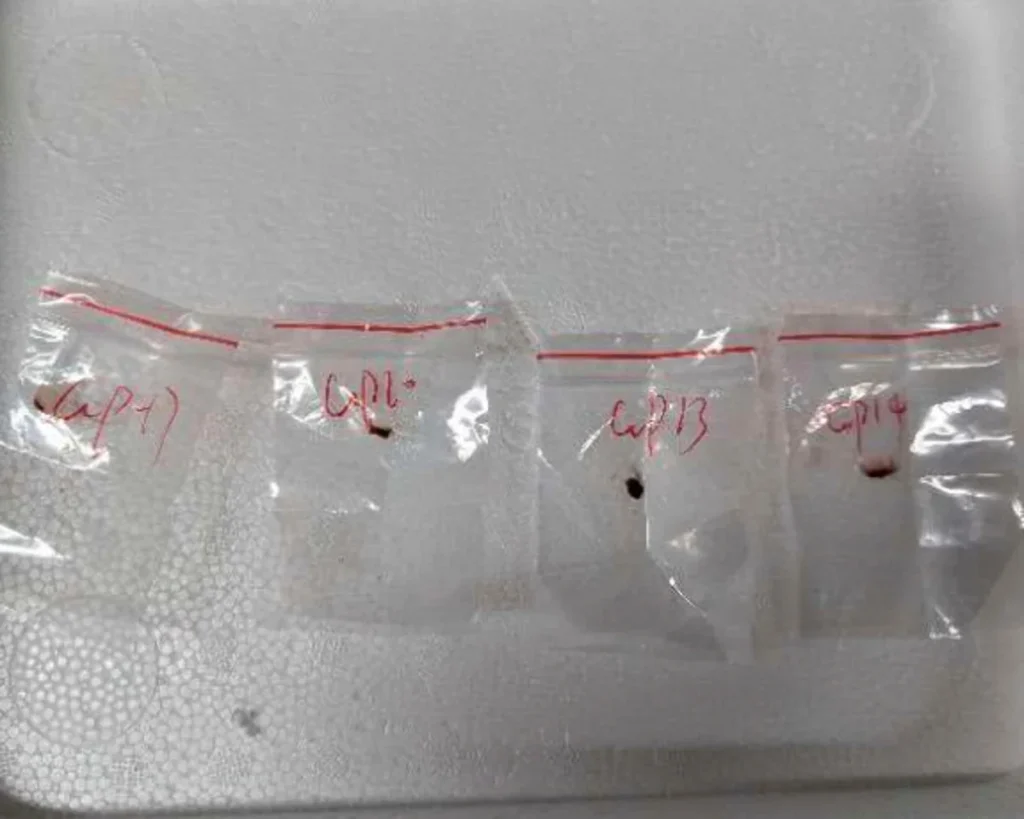Two researchers from the People’s Republic of China have been charged with smuggling a high-risk biological pathogen, Fusarium graminearum, into the United States. The incident has raised serious concerns about national security and the potential threat to American agriculture.

The smuggled fungus is a toxic pathogen that can cause significant damage to crops. The charges brought against the two Chinese nationals have sparked alarm about the potential for agroterrorism.
Key Takeaways
- Two Chinese researchers are charged with smuggling a high-risk biological pathogen.
- The smuggled fungus, Fusarium graminearum, is a toxic pathogen that can damage crops.
- The incident has raised concerns about national security and agroterrorism.
- The charges have sparked alarm about the potential threat to American agriculture.
- The FBI has called it a potential agroterrorism weapon threatening food security.

The Arrest at Detroit Airport: How the Fungus Smuggling Plot Unfolded
Federal authorities intercepted a potentially catastrophic biological threat at Detroit Airport, sparking a national security alarm. The incident involved two Chinese scientists, Yunqing Jian and Zunyong Liu, who were arrested for attempting to smuggle a dangerous fungus into the United States. This event has highlighted significant concerns regarding biosecurity and the potential for agroterrorism.
Detection and Interception of the Biological Material
The smuggling plot was uncovered at Detroit Metropolitan Airport, where Jian and Liu arrived with the fungus, identified as Fusarium graminearum, a pathogen known to cause Head Blight disease in crops. U.S. Customs and Border Protection (CBP) officers detected the biological material during a routine inspection. The agents recognized the potential danger and immediately notified the FBI, leading to a coordinated investigation.
The detection process involved advanced screening techniques that identified the fungus as a regulated biological material. This prompt action prevented the potential release of the pathogen into the U.S. environment, averting a possible agricultural disaster. The incident underscores the critical role of vigilant border control in preventing biohazards.

Initial Response from Federal Authorities
Upon notification, the FBI initiated a thorough investigation into the circumstances surrounding the smuggling attempt. The agents worked closely with the U.S. Attorney’s Office for the Eastern District of Michigan to build a case against Jian and Liu. The charges include conspiracy, smuggling, and making false statements, reflecting the seriousness with which the U.S. government views such biosecurity breaches.
The swift response by federal authorities demonstrates a robust mechanism for handling potential bioterrorism threats. The FBI’s involvement signifies the incident’s potential national security implications and the need for a comprehensive investigation. As the case unfolds, it is likely to draw attention to the broader issues of US-China biosecurity tensions and the challenges of preventing such incidents in the future.
Who Are Yunqing Jian and Zunyong Liu? Background of the Accused Scientists
The case of Yunqing Jian and Zunyong Liu, Chinese scientists accused of smuggling a dangerous fungus into the United States, has sparked a national security alarm. To understand the severity of the situation, it’s crucial to delve into the backgrounds of these two individuals.
Professional Backgrounds and Research History
Yunqing Jian, aged 33, is a Chinese national who was working as a researcher at the University of Michigan. Her role involved conducting research on various biological materials, including the fungus Fusarium graminearum, which is known to cause head blight disease in crops. Jian’s professional background includes significant research experience in mycology, the study of fungi.
Zunyong Liu, 34, is another Chinese national who was collaborating with Jian. Liu was primarily based in China but traveled to the U.S. on a visa. His research interests aligned with Jian’s, focusing on fungal pathogens and their implications for agriculture.
Both Jian and Liu have been associated with research institutions in China, raising questions about their connections to the Chinese government’s research initiatives.
Connections to Chinese Government and CCP
The connections between Jian, Liu, and the Chinese government are a critical aspect of this case. Research funding and collaboration between China and U.S. institutions have been subjects of scrutiny, with concerns about potential espionage and the transfer of sensitive technology.
| Aspect | Jian’s Background | Liu’s Background |
|---|---|---|
| Research Focus | Fungal pathogens, mycology | Fungal pathogens, agricultural impact |
| Primary Affiliation | University of Michigan | Chinese University |
| Connection to Chinese Government | Research funding ties | Collaborations with Chinese institutions |
The table above summarizes key aspects of Jian and Liu’s backgrounds, highlighting their research focuses and affiliations. Understanding these details is essential to grasping the complexities of the case against them.
The investigation into Jian and Liu’s activities has raised broader questions about the oversight of foreign researchers in U.S. institutions and the potential risks associated with international scientific collaborations.
Understanding the Chinese Fungus Fusarium Graminearum: Yunqing Jian’s Smuggled Agroterrorism Pathogen
A recent incident involving Chinese scientists smuggling Fusarium graminearum into the U.S. has raised concerns about agroterrorism. This fungus is known for causing head blight in wheat, maize, barley, and rice, leading to significant agricultural losses.
Biological Properties and Agricultural Impact
Fusarium graminearum is a toxic fungus that produces mycotoxins harmful to humans and livestock. The disease it causes, head blight, results in substantial crop damage and economic losses. Globally, head blight has caused billions of dollars in losses, affecting food security and the agricultural economy.
The fungus infects crops, particularly during flowering, and can lead to reduced yields and contaminated grain. The mycotoxins produced by Fusarium graminearum can be harmful if ingested, posing a risk to human and animal health.
Why It’s Classified as a Potential Bioweapon
Fusarium graminearum is considered a potential bioweapon due to its ability to cause widespread damage to crops. Its potential use in agroterrorism could have devastating effects on a country’s food supply and economy. The ease of dissemination and the severity of the damage it can cause make it a significant bioterrorism threat.
The classification of Fusarium graminearum as a potential bioweapon highlights the need for strict biosecurity measures to prevent its misuse. It also underscores the importance of monitoring and controlling the spread of such pathogens.
The Legal Charges: Breaking Down the Federal Case Against the Chinese Nationals
The Department of Justice has brought forth a complex case against Jian and Liu, involving conspiracy, smuggling, and visa fraud allegations. This legal battle is not just about two individuals; it represents a significant moment in the ongoing discussions about biosecurity, scientific collaboration, and national security between the U.S. and China.

Conspiracy and Smuggling Charges
The criminal complaint charges Jian and Liu with conspiracy to smuggle a dangerous biological agent into the United States. This charge is severe because it involves not just the act of smuggling but also the planning and coordination that went into it. The smuggling charge itself relates to the illegal transportation of Fusarium graminearum, a fungus that can cause significant agricultural damage.
The charges against them highlight the seriousness with which the U.S. government views such actions. As part of the conspiracy charge, it is alleged that Jian and Liu worked together to evade regulations designed to protect U.S. agriculture and public health.
False Statements and Visa Fraud Allegations
In addition to conspiracy and smuggling, Jian and Liu are also accused of making false statements to federal officials. These statements were allegedly made during their interactions with U.S. authorities, potentially during their visa application process or when questioned about the biological material they were carrying.
The visa fraud allegations suggest that the accused may have misrepresented the purpose of their visit or concealed information relevant to their eligibility for a U.S. visa. This aspect of the case underscores the importance of honesty and transparency in international travel and scientific collaboration.
Potential Penalties if Convicted
If convicted, Jian and Liu face significant penalties. The charges against them carry potential sentences that could include substantial prison time and fines. The exact penalties would depend on the outcome of the trial and the specific charges for which they are convicted.
The case against Jian and Liu serves as a reminder of the legal and regulatory frameworks that govern the movement of biological materials across international borders. It also highlights the ongoing challenges in balancing scientific collaboration with national security and biosecurity concerns.
University of Michigan’s Role: Unauthorized Research and Laboratory Security Failures
A serious lapse in laboratory security protocols at the University of Michigan enabled two Chinese researchers to allegedly smuggle and study a potentially devastating agricultural pathogen. The incident has raised significant concerns about the university’s adherence to federal regulations regarding the handling of dangerous biological materials.
Lack of Federal Clearance for Dangerous Pathogen Research
The research conducted by Yunqing Jian and Zunyong Liu involved Fusarium graminearum, a fungus known to cause head blight disease in crops such as wheat, barley, and maize. This pathogen is classified as a potential bioweapon due to its significant impact on agricultural productivity. Federal regulations require special clearance for research involving such dangerous pathogens to ensure they are handled safely and securely.
However, it appears that the University of Michigan did not obtain the necessary federal clearance for this research. The lack of proper oversight and clearance for handling dangerous pathogens raises serious questions about the university’s laboratory security protocols and its ability to manage high-risk biological materials.
How the Scientists Gained Access to University Facilities
Yunqing Jian, one of the accused Chinese nationals, was affiliated with the University of Michigan. Her position within the university allegedly provided her with access to laboratory facilities where she could conduct research on the smuggled fungus. The specifics of how Jian and Liu gained access to these facilities are under investigation, but it is clear that there was a significant failure in the university’s security measures.
The incident highlights the need for stricter controls on who can access laboratory facilities, especially those equipped to handle dangerous pathogens. It also underscores the importance of verifying the credentials and research intentions of visiting scientists, particularly those from foreign countries.
The Threat to American Agriculture: Potential Impact of Head Blight Disease on U.S. Crops
The smuggling of Fusarium graminearum, a fungus known to cause head blight disease, poses a significant threat to American agriculture. This pathogen can infect various crops, including wheat, maize, barley, and rice, potentially leading to widespread agricultural damage.

Vulnerability of Wheat, Maize, Barley, and Rice Crops
Fusarium graminearum is particularly dangerous because it can infect a wide range of crops at different stages of growth. Wheat, maize, barley, and rice are all susceptible to head blight disease, which can result in reduced yields and contaminated grain.
The vulnerability of these crops is exacerbated by factors such as weather conditions and agricultural practices. For instance, moist and warm weather during flowering can increase the risk of infection.
- Wheat: Head blight can cause significant yield loss and reduce grain quality.
- Maize: Ear rot caused by Fusarium graminearum can lead to mycotoxin contamination.
- Barley: Infection can result in reduced malt quality and yield.
- Rice: While less common, Fusarium head blight can still impact rice crops, especially in certain regions.
Economic Consequences of Potential Outbreak
The economic consequences of a Fusarium graminearum outbreak in the U.S. could be severe. The impact on agricultural production, trade, and related industries would be significant.
| Crop | Potential Yield Loss | Economic Impact |
|---|---|---|
| Wheat | Up to 50% yield loss in infected areas | $1 billion+ annual loss |
| Maize | 30-50% yield loss | $2 billion+ annual loss |
| Barley | 20-40% yield loss | $500 million+ annual loss |
As noted by agricultural experts, “The introduction of such a pathogen could lead to a significant economic burden on farmers and the agricultural industry as a whole.”
“The potential for Fusarium graminearum to cause widespread damage to U.S. crops is a serious concern that requires immediate attention from agricultural authorities and policymakers.”
The economic impact would not be limited to crop yields alone; it would also affect related industries such as food processing and livestock feed.
Agroterrorism as a National Security Concern: FBI and Department of Justice Perspectives
A recent incident involving the smuggling of a dangerous fungus into the U.S. has underscored the vulnerability of the country’s agricultural sector to agroterrorism. This event has brought to light the significant national security concerns associated with agroterrorism, prompting a closer examination by the FBI and the Department of Justice.
Historical Context of Agricultural Bioterrorism Threats
Agroterrorism is not a new threat; it has been a concern for decades. The potential for biological agents to be used against agricultural targets poses a significant risk to food security and the economy. Historically, there have been instances where biological agents have been considered or used for agroterrorism. For example, during World War II, the U.S. and other nations researched the potential for using biological agents against crops.
Current U.S. Defenses Against Biological Attacks on Agriculture
The U.S. has implemented various measures to defend against agroterrorism. These include:
- Enhanced surveillance and monitoring of agricultural health
- Regulations on the handling and transportation of biological materials
- Collaboration between law enforcement, agricultural, and health agencies
- Research into detection and mitigation technologies
The FBI and Department of Justice play crucial roles in investigating and prosecuting cases related to agroterrorism. As U.S. Attorney Jerome F. Gorgon, Jr. noted, cases like the one involving the smuggled fungus are considered “of the gravest national security concerns” due to their potential to harm the agricultural Midwest.
| Agency | Role in Countering Agroterrorism |
|---|---|
| FBI | Investigates and prosecutes agroterrorism cases |
| Department of Justice | Provides legal framework and prosecution for agroterrorism offenses |
| USDA | Monitors agricultural health and implements protective measures |
The issue of agroterrorism highlights the need for continued vigilance and cooperation among government agencies, the agricultural sector, and the public to protect against this significant national security threat.
U.S.-China Tensions: How the Fungus Case Fits into Broader Diplomatic and Security Issues
The case of Yunqing Jian and Zunyong Liu, two Chinese scientists accused of smuggling a fungus that could devastate U.S. crops, has brought the issue of scientific espionage to the forefront of diplomatic relations between the U.S. and China. This incident is not isolated but rather part of a larger narrative of growing tensions between the two nations in the realm of scientific research and biosecurity.
Recent History of Scientific Espionage Concerns
The issue of scientific espionage has been a growing concern in U.S.-China relations over the past decade. There have been numerous instances where Chinese nationals have been accused of stealing sensitive information or smuggling biological materials into the U.S. Jian’s electronic devices contained documents detailing her allegiance to the Chinese Communist Party and her prior receipt of Chinese state funding for pathogen research, highlighting the complex web of connections between Chinese scientists and their government.
This connection raises serious questions about the potential for state-sponsored scientific espionage. The fact that Jian was funded by the Chinese government and is a member of the CCP underscores the risks associated with allowing foreign nationals, especially those with ties to foreign governments, to conduct sensitive research in U.S. institutions.
Impact on Academic and Research Collaboration
The fungus smuggling case has significant implications for academic and research collaboration between the U.S. and China. Universities and research institutions in the U.S. have been grappling with how to balance the need for international collaboration with the risks of scientific espionage. The incident involving Jian and Liu highlights the need for stricter oversight and screening of foreign researchers, particularly those from countries with known histories of scientific espionage.
The U.S. government has been working to strengthen biosecurity protocols and enhance collaboration between law enforcement and the academic community to prevent similar incidents in the future. However, the challenge remains in finding the right balance between openness and security in scientific research.
Biosecurity Protocols: What Went Wrong and How to Prevent Future Incidents
The recent incident involving Chinese scientists smuggling a potentially dangerous fungus into the U.S. has highlighted significant vulnerabilities in the country’s biosecurity protocols. This event has come amid rising U.S.-China tensions and a visa crackdown by the Trump administration, underscoring the complex interplay between national security, scientific research, and international relations.
The investigation into this incident involved extensive coordination among U.S. Customs and Border Protection (CBP) offices across the country, demonstrating the need for a multi-faceted approach to biosecurity. To understand what went wrong and how to prevent future incidents, it’s essential to examine the current gaps in border screening for biological materials.
Current Gaps in Border Screening for Biological Materials
Border screening for biological materials is a critical component of biosecurity protocols. However, the case of Yunqing Jian and Zunyong Liu has revealed significant gaps in this process. The ability of the accused scientists to smuggle Fusarium graminearum into the U.S. highlights the need for more robust detection methods and stricter controls on the importation of potentially dangerous biological materials.
Currently, the U.S. relies on a combination of intelligence gathering, risk assessment, and physical inspections to screen for biological threats at borders. However, the complexity and diversity of biological materials make it challenging to detect all potential threats. Improving border screening requires advancements in detection technology, enhanced training for CBP officers, and better international cooperation to identify and mitigate risks.
Recommendations for Strengthening Research Oversight
In addition to improving border screening, strengthening research oversight is crucial for preventing the misuse of biological materials. This includes ensuring that research involving potentially dangerous pathogens is conducted with appropriate safety measures and under proper regulatory supervision.
To enhance research oversight, we recommend:
- Implementing more stringent review processes for research proposals involving potentially dangerous biological materials.
- Enhancing training and safety protocols for researchers working with hazardous pathogens.
- Improving collaboration between research institutions, government agencies, and international partners to share best practices and coordinate oversight efforts.
By addressing these gaps and implementing stronger biosecurity protocols, the U.S. can better protect its agricultural sector and national security from the threats posed by biological materials. This incident serves as a critical reminder of the need for ongoing vigilance and continuous improvement in biosecurity measures.
Conclusion: Implications for U.S. Food Security and International Relations
The chinese fungus smuggling case has significant implications for U.S. food security and international relations, raising serious concerns about national security and the potential threat to American agriculture.
The agroterrorism pathogen in us, identified as Fusarium graminearum, poses a substantial biological threat to american agriculture, potentially devastating crops such as wheat, maize, barley, and rice.
This incident has escalated us-china biosecurity tensions, highlighting the need for stricter regulations and oversight in research collaborations between the two nations.
To mitigate the biological threat to american agriculture, it is crucial to strengthen border screening for biological materials and enhance research oversight, ensuring that sensitive research is properly authorized and secured.
The case underscores the importance of vigilance in protecting U.S. food security and maintaining robust international relations, particularly in the context of scientific research and collaboration.
FAQ
What is Fusarium graminearum and why is it considered a threat to American agriculture?
Fusarium graminearum is a toxic fungus that can cause significant damage to crops, particularly wheat, maize, barley, and rice. It is considered a potential bioweapon due to its ability to produce mycotoxins that can harm humans and animals, and its potential to cause widespread damage to agricultural crops.
Who are Yunqing Jian and Zunyong Liu, and what are they accused of?
Yunqing Jian and Zunyong Liu are two Chinese nationals who were arrested at Detroit Airport for allegedly smuggling the fungus Fusarium graminearum into the United States. They are accused of conspiracy, smuggling, and making false statements to federal authorities.
How did the fungus smuggling plot get detected and interdicted?
The plot was detected when Yunqing Jian and Zunyong Liu arrived at Detroit Airport with vials of Fusarium graminearum in their luggage. US Customs and Border Protection officials discovered the fungus during a routine inspection, and the FBI was notified to investigate further.
What are the potential penalties if Yunqing Jian and Zunyong Liu are convicted?
If convicted, Yunqing Jian and Zunyong Liu face significant penalties, including fines and imprisonment, for conspiracy, smuggling, and making false statements to federal authorities.
What is the role of the University of Michigan in this incident?
The University of Michigan is implicated in the incident because Yunqing Jian and Zunyong Liu allegedly gained access to university facilities to conduct research on the fungus without proper federal clearance.
What are the implications of this incident for U.S.-China relations?
The incident has raised concerns about scientific espionage and the potential for biological threats to U.S. agriculture, which could strain U.S.-China relations and impact academic and research collaboration between the two countries.
What are the current gaps in border screening for biological materials, and how can they be addressed?
Current gaps in border screening for biological materials include inadequate training and resources for customs officials, as well as a lack of standardized protocols for detecting and handling biological materials. To address these gaps, the U.S. government can invest in training and technology to improve detection capabilities and develop more effective protocols for handling biological materials.
What is agroterrorism, and why is it a national security concern?
Agroterrorism refers to the deliberate release or dissemination of biological agents, such as the fungus Fusarium graminearum, to cause harm to agricultural crops and the economy. It is a national security concern because it can have significant economic and social impacts, as well as pose a threat to food security.
How can research oversight be strengthened to prevent future incidents?
Research oversight can be strengthened by implementing more stringent protocols for handling and storing biological materials, improving background checks and clearance procedures for researchers, and enhancing collaboration between law enforcement and regulatory agencies.





















































